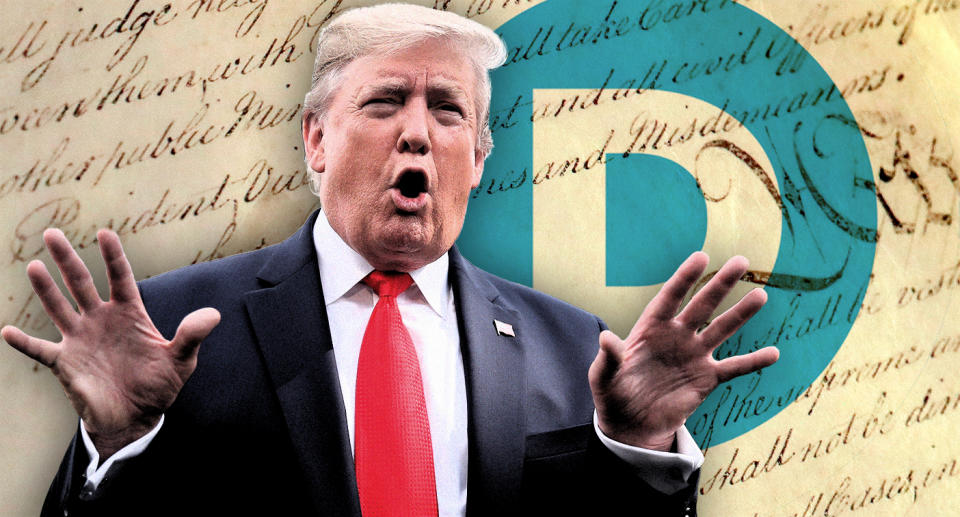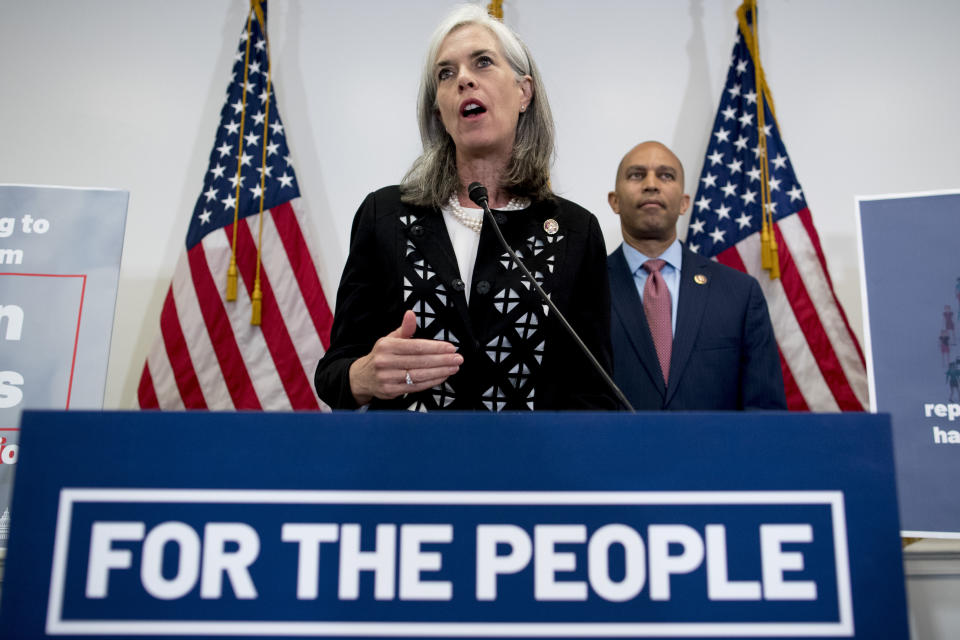More than 100 Democrats now onboard with Trump impeachment inquiry
More than a dozen additional Democrats have come out in favor of beginning an impeachment inquiry into President Trump in the fallout from Robert Mueller’s testimony last week.
On Thursday, Rep. Katherine Clark, D-Mass., said she now favored impeachment. Clark, vice chair of the Democratic caucus, is the highest-ranking House Dem to come out in favor of the step. Clark said she was motivated by concerns over how Republicans, following Trump’s lead, are ignoring concerns about securing future elections from tampering.
“Listening to [Mueller’s] testimony, revisiting what was laid out in that report about the president’s attempt to obstruct justice was disturbing,” Clark told the Boston Globe. “But the moment that was pivotal for me was when [Senate Majority Leader] Mitch McConnell blocked a vote on an election security bill on the very same day that Robert Mueller warned us that Russia interfered in our elections, and that it is continuing to do so. It shows a disconnect, and a disregard for our democracy that we simply cannot turn away from.”
On Friday, Rep. Chris Pappas of New Hampshire’s First District came out in favor of beginning an inquiry. Pappas represents a swing district that Trump won in 2016, and is part of the Democratic leadership’s frontline in seeking to protect its majority in 2020.

“After carefully reviewing Special Counsel Mueller’s report and his testimony to Congress, I have concluded there’s more work to do to protect our democracy and uphold the rule of law and the Constitution,” said Pappas in a statement. “After weeks of careful consideration and after countless conversations with my constituents, I believe it is imperative that Congress continues its oversight work by opening an impeachment inquiry.”
He was joined by freshman Rep. Mike Levin of California’s 49th District, who won a Republican-held seat in 2018.
“I do not take this decision lightly — quite the opposite,” said Levin in a statement. “Moreover, given the current political climate, it may prove impossible to impeach the president regardless of what a House inquiry reveals. But it remains my responsibility to do what I can to protect the rule of law and defend the Constitution. I take that responsibility very seriously.”
On Sunday, four of the seven Democratic representatives from the state of Washington joined their three colleagues in supporting an impeachment inquiry, making the party’s delegation unanimous. (The state’s three Republicans in Congress haven’t joined.) Reps. Kim Schrier, Suzan DelBene, Derek Kilmer and Denny Heck cited corruption, obstruction of justice and failure to protect elections from foreign interference as justifications.
They were joined by Sen. Patty Murray, the third-ranking Democrat in the Senate, who issued a statement saying she supported beginning the process. Murray has no formal role in impeachment, which requires action by the House, but as a senator she would vote on the president’s fate if the lower chamber brings charges, in addition to being an influential figure in national Democratic politics.
“I agree with my fellow members of the Washington delegation that, as we have learned about the gravity of the potential threats to our democracy identified in special counsel Mueller’s report, it has become clear that the House should begin proceedings to determine whether the president’s action necessitate impeachment,” said Murray in a statement.
Rep. Jerry Nadler, who chairs the House Judiciary Committee that would oversee impeachment proceedings, said Sunday that Trump “richly deserves” impeachment but that the decision rested on accumulating enough evidence to persuade the public. The New York Times reported last week that Nadler is gradually moving toward beginning the process “as expeditiously as possible.”
In addition to at least 106 Democrats, Rep. Justin Amash of Michigan supports beginning an impeachment inquiry. Amash was a Republican until a few weeks ago, when he became the first member of his party in the House to call for impeachment; he left the party soon afterward and now identifies as an Independent. Last week, a Fox News poll found that a slim plurality of respondents favored impeachment, 47-45, with 8 percent undecided.

Beginning an inquiry would not necessarily lead to impeachment, which is analogous to a criminal indictment, leading to a trial, that would take place in the Senate. The House would first investigate whether there was sufficient evidence that the president had met the standard in the Constitution of “treason, bribery, or other high crimes and misdemeanors.” Following Mueller’s special counsel report, it’s likely that obstruction of justice would top the list but concerns have also been raised about Trump’s personal and business dealings, including allegations of insurance fraud, dubious tax schemes and money laundering.
If an impeachment resolution is brought to the floor the full House, Democrats and Republicans would vote on articles of impeachment. If they approve one or more of them by a simple majority, the president would officially be impeached, but not removed from office.
At that point, proceedings would move to the Senate, which is required to hold a trial, with members of the House serving as the prosecution and lawyers chosen by the White House mounting a defense. The chief justice would preside. For the president to be removed from office requires a two-thirds majority of the Senate. If the vote falls short — which seems highly likely considering the near-lockstep support he currently enjoys from Republicans — the president would be acquitted and remains in office.
Trump has previously expressed confusion about how the process works, saying that he didn’t think “the courts” — which are not involved in a House investigation — would allow it.
“I don't see how,” said the president when asked in May if he thought he was going to be impeached. “They can because they’re possibly allowed although I can’t imagine the courts allowing it. I never got into it. I never thought it would even be possible to be using the word. To me it’s a dirty word, the word ‘impeach.’ A dirty, filthy, disgusting word.”
Two previous presidents have been impeached — Andrew Johnson in 1868 and Bill Clinton in 1998 — but the Senate failed to convict and they both remained in office. The House began impeachment proceedings against Richard Nixon in 1974, but he resigned before a full House vote on the articles took place, likely escaping the stigma of becoming the only president to be removed from office.
_____
Download the Yahoo News app to customize your experience.
Read more from Yahoo News:



